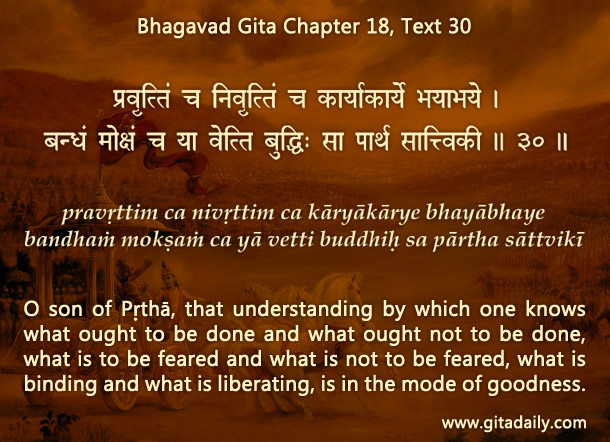Intelligence is essentially the ability to make good choices. For example, IQ tests often assess students’ intelligence based on their ability to choose the right options in a multiple-choice exam.
Life constantly presents us multiple choices, be they of routes, gadgets, cars, homes, careers or partners. Choosing properly among these options also requires intelligence, even if that intelligence isn’t measured by IQ tests.
All such choices arise from a foundational choice that defines our intelligence: the choice of our thoughts. Frequently, some thought pops up inside us and we uncritically give it our attention. Powered by such contemplation, that thought quickly grows into a desire, an intention and an action. If that action is self-destructive, we may wonder, “Why did I do that?” It was because we didn’t choose our thoughts intelligently.
To choose among our thoughts, we first need to become aware that our thoughts are different from us. Such awareness is fostered by Gita wisdom. It explains that at our core, we are souls, who are presently covered by a subtle body and a gross body. In our subtle body is the mind that is the generator of thoughts and the intelligence that is the evaluator of thoughts.
The Gita (18.30) indicates that a robust intelligence – intelligence situated in the mode of goodness – evaluates thoughts dispassionately, based on whether the consequent actions are productive or counterproductive. Studying the Gita regularly sharpens our intelligence, equipping us to recognize which thoughts are beneficial and which unbeneficial. And living the Gita by practicing bhakti-yoga connects our finite intelligence with the Infinite’s intelligence, thereby increasing dramatically our ability to act intelligently, that is, transform our beneficial thoughts into productive actions.
As thoughts are the basis of all our choices, the intelligence to choose our thoughts wisely improves all our choices.
Think it over:
- Why do we do things that we later regret?
- How are the mind and the intelligence related to thoughts?
- How can we enhance our intelligence?
To know more about this verse, please click on the image
Explanation of article:
Podcast:


very well said to achieve our ultimate goal which is happiness we need to choose ourthughrs intellectually.
Thank u for explaining the chapter 18.36 so well.